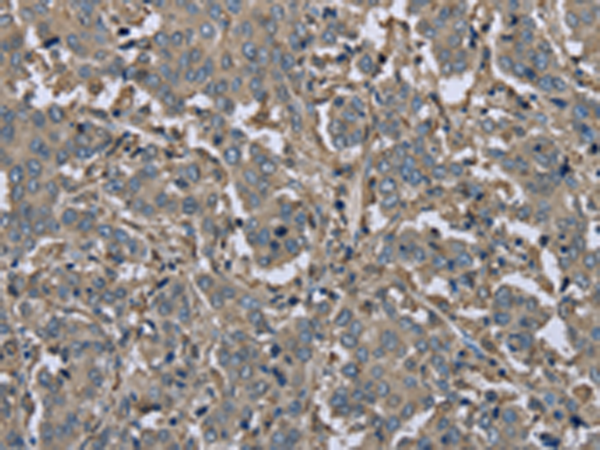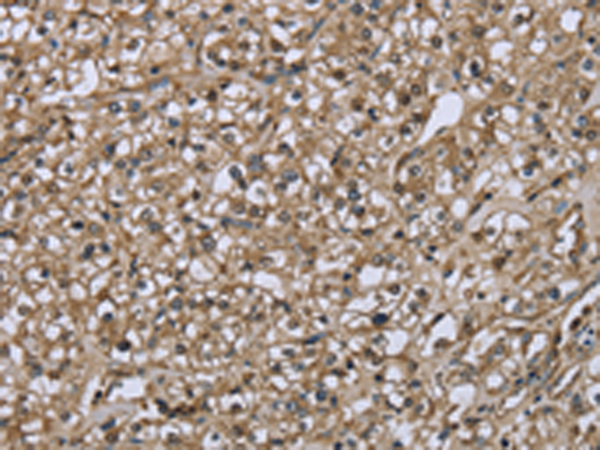


| WB | 咨询技术 | Human,Mouse,Rat |
| IF | 咨询技术 | Human,Mouse,Rat |
| IHC | 1/50-1/200 | Human,Mouse,Rat |
| ICC | 技术咨询 | Human,Mouse,Rat |
| FCM | 咨询技术 | Human,Mouse,Rat |
| Elisa | 1/5000-1/10000 | Human,Mouse,Rat |
| Aliases | FBP |
| WB Predicted band size | 37 kDa |
| Host/Isotype | Rabbit IgG |
| Antibody Type | Primary antibody |
| Storage | Store at 4°C short term. Aliquot and store at -20°C long term. Avoid freeze/thaw cycles. |
| Species Reactivity | Human, Mouse |
| Immunogen | Fusion protein of human FBP1 |
| Formulation | Purified antibody in PBS with 0.05% sodium azide and 50% glycerol. |
+ +
以下是关于CDCA5抗体的3篇参考文献示例(内容基于典型研究方向模拟,仅供参考):
---
1. **文献名称**:*CDCA5 promotes hepatocellular carcinoma progression by regulating cell cycle and immune infiltration*
**作者**:Zhang Y, et al.
**摘要**:本研究利用CDCA5抗体进行免疫组化和Western blot分析,发现CDCA5在肝癌组织中显著高表达,并与患者不良预后相关。实验表明,CDCA5通过调控细胞周期蛋白(如Cyclin B1)促进肿瘤增殖,并可能影响肿瘤微环境中的免疫细胞浸润。
---
2. **文献名称**:*Sororin (CDCA5) drives cancer stemness via Wnt/β-catenin signaling in breast cancer*
**作者**:Li X, et al.
**摘要**:通过CDCA5抗体介导的基因沉默和染色质免疫沉淀(ChIP)实验,作者发现CDCA5通过激活Wnt/β-catenin通路维持乳腺癌干细胞特性。临床样本分析显示,CDCA5高表达与化疗耐药性和转移风险增加显著相关。
---
3. **文献名称**:*CDCA5 as a novel prognostic biomarker in colorectal cancer: Evidence from antibody-based tissue microarray analysis*
**作者**:Wang H, et al.
**摘要**:研究使用CDCA5抗体对结直肠癌组织芯片(TMA)进行染色,结合生存分析,证实CDCA5过表达是独立预后因素。机制研究表明,CDCA5通过稳定E2F1蛋白促进肿瘤细胞侵袭,可能成为潜在治疗靶点。
---
**注**:以上内容为模拟文献摘要,实际文献需通过PubMed、Web of Science等平台检索关键词“CDCA5 antibody”或“Sororin antibody”获取。近年研究多聚焦于CDCA5在肿瘤中的调控机制及抗体在诊断/治疗中的应用潜力。
CDCA5 (Cell Division Cycle Associated 5), also known as Sororin, is a regulatory protein critical for proper sister chromatid cohesion and separation during mitosis. It stabilizes cohesin complexes on chromosomes after DNA replication, ensuring accurate chromosome alignment and segregation. Dysregulation of CDCA5 is implicated in carcinogenesis, with overexpression observed in cancers like hepatocellular carcinoma, colorectal cancer, and breast cancer, often correlating with poor prognosis, metastasis, and therapeutic resistance.
CDCA5 antibodies are essential tools for studying its biological roles and clinical relevance. These antibodies enable detection of CDCA5 expression and localization via techniques such as Western blotting, immunohistochemistry (IHC), and immunofluorescence (IF). Researchers use them to explore CDCA5's function in cell cycle control, DNA repair, and tumor progression. For instance, CDCA5 knockdown or inhibition reduces cancer cell proliferation, suggesting its potential as a therapeutic target. Commercially available CDCA5 antibodies are typically validated using recombinant proteins or cell lines to ensure specificity, aiding studies on cancer biomarkers and drug development. Their applications extend to evaluating CDCA5 as a diagnostic or prognostic indicator in clinical samples, further highlighting their importance in oncology research.
×